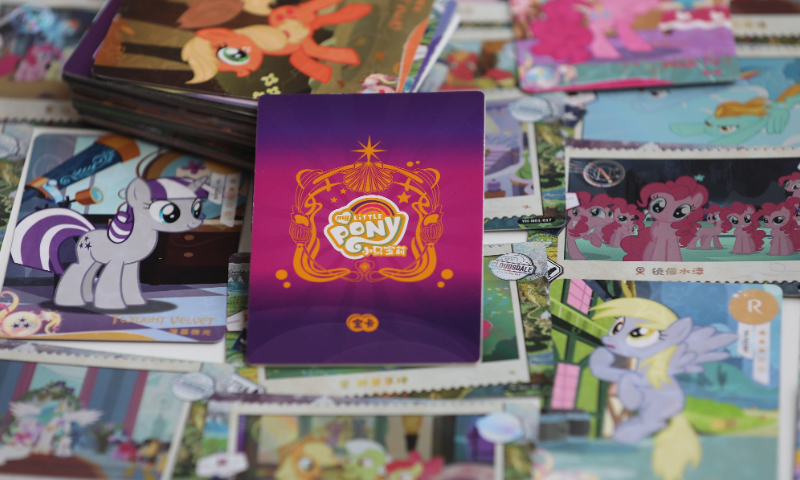
The photo taken on July 14, 2024 shows My Little Pony cards bought by a primary school student in Anyang, Henan Province. Photo: VCG
My Little Pony trading cards have gained immense popularity among elementary school students in China. The cards are sold in a blind-box format, and the rarest cards, known as high-tier cards, have recently been priced at 160,000 yuan ($20,000) on the secondary market.
"Although rumors claim some cards are priced that high, actual transaction prices are much lower. Most cards sell for just a few to several dozen yuan. These sky-high prices are mostly hype created to attract attention and generate traffic, and actual transactions rarely reach such amounts," Miao Cai, a seller on an online trading platform for card games, told the Global Times.
A few years ago, when the craze for Ultraman cards was still strong, My Little Pony cards quickly became a new popular collectible among elementary school students.
This phenomenon is attributed to the diverse range of cards and the blind-box sales method, which has attracted many children to buy, collect and trade them.
In physical stores, stationery and toy shops have prominently displayed My Little Pony cards to cater to children's demands. Online platforms also feature these cards prominently, with some video bloggers drawing large audiences by livestreaming card packet openings.
Miao said the cards are so popular because children make connections within their peer groups by collecting and trading cards. "Those involved in card collecting can more easily integrate into social circles, while those who do not participate might be left out. This social mechanism leads kids to become self-driven promoters of the cards, with minimal additional marketing needed from the companies," Miao said.
Miao pointed out that the supposed rarity of certain cards adds to their allure. "Children who own more rare cards tend to gain more attention and admiration. This scarcity and financial investment amplify the perceived value of the cards."
"The process of opening [packets of] cards is filled with uncertainty and anticipation. Children may continue to buy cards due to curiosity and a sense of adventure. This mindset is similar to gambling, as kids often hold onto the belief that the next pack might contain a rare card, making it difficult for them to stop buying," Miao noted.
Netizens on social media generally believe that while collecting cards reflects children's curiosity and exploration, excessive obsession can affect their studies and social relationships. Instead of outright banning card collecting, parents can guide their children to understand the commercial logic behind the cards.
One generation's My Little Pony cards may eventually be replaced by new trends, but this phenomenon is not unusual. The key is to balance interests with other aspects of life, avoid blindly chasing transient fads and maintain rational consumption.
